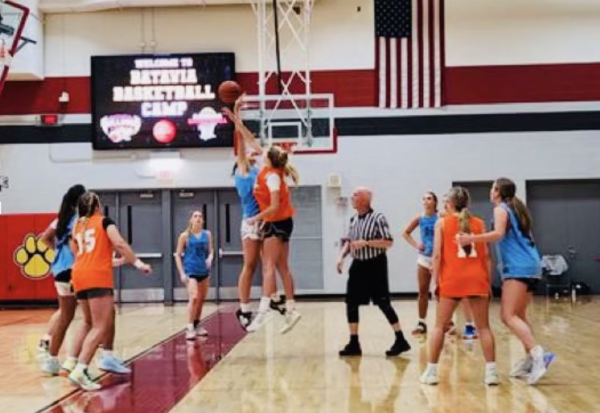Healthy eating for athletics
Salad with grilled chicken, quinoa, and vegetables
February 19, 2020
Most people have heard the phrase, “You are what you eat.” For athletes, this saying is especially important. It reflects how dieting can affect a person’s entire life, including their sport and athletic performance.
But how much does nutrition really affect sports? And what constitutes a healthy diet for high school athletes?
It is true that eating healthy can lead to improvements in energy levels, mood, and athletic performance, according to MedlinePlus. The food that we put into our bodies acts as our fuel, whether that’s for training, recovery, or competition.
FamilyDoctor.org says that most experts recommend a diet of protein, carbohydrates, fats, and vitamins to maximize performance. Eating too much of one food group can be unhealthy for any athlete, especially teenagers who are still growing and developing.
When thinking about a healthy diet as an athlete, there is a lot to consider, but obsessing about food can actually backfire. Often times people believe they are eating healthier when they are really just eating less, resulting in a lack of necessary nutrients.
According to KidsHealth.org, “Extreme calorie restriction can lead to growth problems and other serious health risks for both girls and guys, including increased risk for fractures and other injuries.”
At Nazareth, there are a variety of approaches that are taken by sports teams to obtain healthy athletes. Most Naz sports teams let the athletes decide how they want to eat; however, sometimes, with pressure of being the best, following a balanced diet can be challenging for the athletes.
When asked if Girls Tennis team members should hypothetically adhere to a specific diet, junior Brigid Sullivan says, “I don’t think my tennis team should follow a specific diet because I think what people eat affects their performance differently and that it is up to that player to decide what they should or should not eat.”
Though losing weight and becoming a healthier person can be important for an athlete aspiring to perform his or her best, extreme dieting is not the way to accomplish these goals. There are healthy ways to lose weight and in order for one to perform at a peak level, they must get all the nutrients they need.
Ultimately, as an athlete it is important to eat a lot of nutritious calories to restore the energy expended each day; that, combined with diligent practice will often lead to peak athletic performance.











